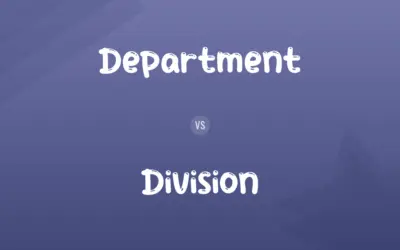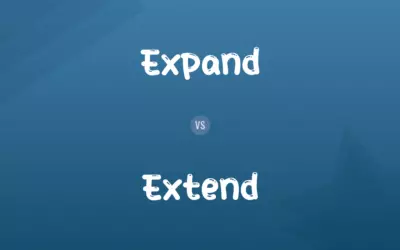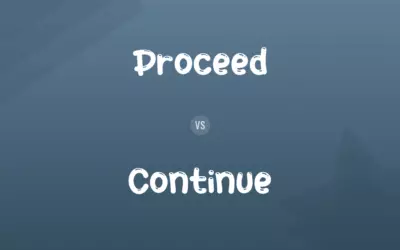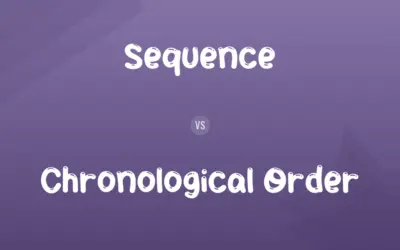Anybody vs. Nobody: Difference and Comparison
By Muazma Batool & Muneeza Rehman — Updated on February 21, 2024
"Anybody" refers to any person at all, often used in questions and negative contexts, while "nobody" denotes the absence of any person, used in affirmative sentences to express negation.
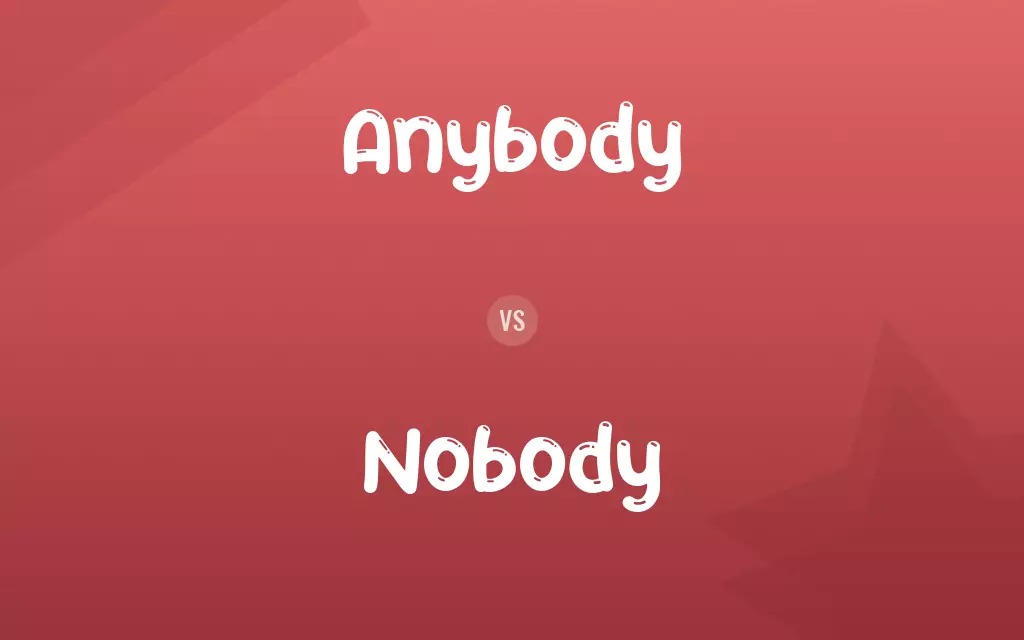
Difference Between Anybody and Nobody
Anybody and nobody are pronouns used to refer to persons, but they serve opposite purposes in communication. Anybody can mean any person at all, often used in interrogative (questions) and negative contexts to indicate inclusivity without specifying who. For example, asking "Is anybody there?" suggests openness to any person's presence. On the other hand, nobody means no person, used in affirmative sentences to indicate a complete absence of people, such as in the statement "Nobody was there."
Muazma Batool
Feb 21, 2024
Anybody is used to express the possibility of any person being involved or included, nobody explicitly states that not a single person is involved or included. The use of anybody often implies a search or question regarding the presence or opinion of an unspecified person. Conversely, nobody conveys a definitive exclusion or absence of people from a situation or context.
Muazma Batool
Feb 21, 2024
In questions, anybody is used to invite a response from anyone who might be applicable, reflecting openness or uncertainty about the involvement of people. Nobody is used in statements to assert the lack of people in a given context, often emphasizing solitude, exclusion, or the absence of activity.
Muazma Batool
Feb 21, 2024
The context in which anybody and nobody are used can significantly affect the meaning of a sentence. Using anybody in a negative sentence can change its implication, as in "There isn't anybody here," which aligns with the meaning of "nobody" but with a different sentence structure. Similarly, nobody can be used to emphasize the lack of participants or volunteers, as in "Nobody volunteered to help."
Muazma Batool
Feb 21, 2024
The choice between anybody and nobody is crucial for clear communication, particularly in conveying presence or absence, inclusion or exclusion, and possibility or negation. Understanding their proper usage is essential for effective and precise language, especially in formal writing or spoken communication.
Jonathan
Feb 21, 2024
Anybody vs. Nobody Comparison Chart
Definition
Refers to any person at all, without specification.
Denotes the absence of any person.
Muazma Batool
Feb 21, 2024
Usage Context
Questions, negative contexts, indicating inclusivity.
Affirmative sentences, expressing complete negation.
Muazma Batool
Feb 21, 2024
Implication
Possibility of inclusion or presence of someone.
Certainty of exclusion or absence of everyone.
Muazma Batool
Feb 21, 2024
Negative Form
Used with negative constructions for inclusivity.
Used in positive constructions to express negation.
William
Feb 21, 2024
Anybody vs. Nobody Definitions
◉Anybody
Implies any person without specification.
If anybody calls, tell them I'll return soon.
Nolan
Feb 21, 2024
◉Nobody
Means no person, emphasizing absence or exclusion.
Nobody answered the question correctly.
Jonathan
Feb 21, 2024
◉Anybody
Refers to an unspecified person in questions or negative contexts.
Does anybody know the time?
Henry
Feb 21, 2024
◉Anybody
Can be used interchangeably with "anyone" in many contexts.
Anybody interested should apply.
Jonathan
Feb 21, 2024
◉Anybody
Used to indicate inclusivity or potential involvement.
Anybody can join the club.
Muazma Batool
Feb 21, 2024
◉Nobody
Affirmative use to express a negative situation.
Nobody knows the trouble I've seen.
Olivia
Feb 21, 2024
◉Anybody
In negative sentences, suggests absence without negating each individual.
There isn't anybody at the door.
Elijah
Feb 21, 2024
◉Nobody
Cannot be directly replaced with "no one" without changing the sentence structure.
Nobody could believe their eyes.
Muazma Batool
Feb 21, 2024
◉Anybody
A person of consequence
Everybody who is anybody was at the reception. See Usage Notes at anyone, every, he1.
Muazma Batool
May 03, 2023
◉Anybody
Any one out of an indefinite number of persons; anyone; any person.
Anybody will do.
Is there anybody inside?
Muazma Batool
May 03, 2023
◉Nobody
Not any person; the logical negation of somebody.
I asked several people, but nobody knew how.
As nobody who is not blind can have failed to notice, I had my hair cut just yesterday.
Muazma Batool
May 03, 2023
◉Anybody
(informal) A person of some consideration or standing.
Everybody who wants to be anybody will come to Jake's party.
Here one isn't anybody, if one doesn't dance like Travolta.
Muazma Batool
May 03, 2023
◉Anybody
Any one out of an indefinite number of persons; anyone; any person.
His Majesty could not keep any secret from anybody.
Muazma Batool
May 03, 2023
◉Anybody
A person of consideration or standing.
All the men belonged exclusively to the mechanical and shopkeeping classes, and there was not a single banker or anybody in the list.
Muazma Batool
May 03, 2023
◉Nobody
A person of no influence or importance; an insignificant or contemptible person.
Muazma Batool
May 03, 2023
Anybody vs. Nobody Frequently Asked Questions
In formal writing, should "anybody" or "nobody" be avoided?
Not necessarily, but their use should be clear and context-appropriate. Clarity and precision are key in formal communication.
Nolan
Feb 21, 2024
Is "nobody" always negative?
While "nobody" expresses negation or absence, it's used in affirmative structures, making its tone context-dependent.
Muazma Batool
Feb 21, 2024
Can "anybody" be used to refer to a specific person?
No, "anybody" is used for general reference, not specific individuals. For specificity, pronouns like "he," "she," or a name are used.
Jonathan
Feb 21, 2024
Is it grammatically correct to use "nobody" in questions?
It's unusual and typically not recommended. Questions are better formed with "anybody" to invite potential affirmation.
Muazma Batool
Feb 21, 2024
Are there contexts where "anybody" is preferred over "anyone"?
Both are widely interchangeable, though "anyone" might be slightly more formal or preferred in written English.
Muazma Batool
Feb 21, 2024
What's the difference in emphasis between "nobody" and "no one"?
The difference is minimal, with both conveying the absence of persons; choice often comes down to stylistic preference.
Nolan
Feb 21, 2024
Can "anybody" and "nobody" be used in the same sentence?
Yes, but it's rare and typically for emphasizing contrast, e.g., "Anybody could do it, but nobody actually did."
Muazma Batool
Feb 21, 2024
How do "anybody" and "nobody" differ from "somebody"?
"Anybody" and "nobody" refer to inclusivity without specificity and complete exclusion, respectively, while "somebody" refers to an unspecified person but implies their presence.
Muazma Batool
Feb 21, 2024
How do "anybody" and "nobody" affect the tone of a sentence?
"Anybody" can imply openness and inclusivity, while "nobody" may suggest exclusion, loneliness, or a lack of action.
Muazma Batool
Feb 21, 2024
How can understanding the use of "anybody" and "nobody" improve communication?
Recognizing their correct application enhances clarity, especially in conveying presence or absence and in framing questions or negations accurately.
Muazma Batool
Feb 21, 2024
Content Creators
Written by
Muazma BatoolAs a content editor, Muazma Batool is not just a grammar guru but a creative mastermind who breathes life into every word. With an eagle eye for detail and a passion for storytelling, she transforms bland text into engaging content that captivates audiences and drives results.
Co-written by
Muneeza RehmanAt Comparisons.wiki, Muneeza skillfully navigates the vast sea of information, ensuring clarity and accuracy as the lead content editor. With a keen eye for detail, she curates every comparison to enlighten and engage readers.




